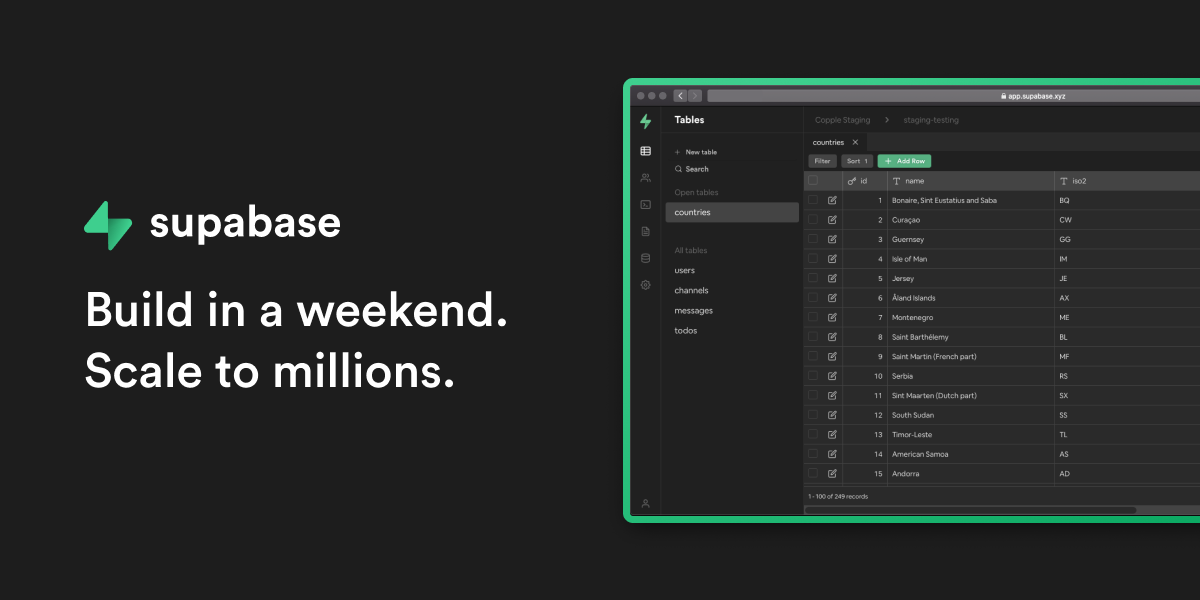Supabase: The Backend of Choice for AI-Powered App Builders

Sayo
Product, Engineering

If you have worked with AI-powered app builders such as Bolt or Lovable, you have probably come across Supabase.
At ForgeCave, out of 5 founders that come to us for improvements/maintenance of their AI-built apps, 4 use Supabase. Second on that list is Firebase. This has led me to think deeply about the effectiveness of Supabase as a backend. I first worked with Supabase a few years ago, integrating its auth and database features into a Golang API. At the time, I never imagined that, just a few years later, I’d be using it this often, especially with the rise of AI-generated coding.
As someone with a traditional coding background and nearly a decade of experience building products, I’ve always been keen on ensuring that the solutions we deliver at ForgeCave meet solid product standards so I had to look more into Supabase.
Below are a few criteria I used to evaluate Supabase; (Note that the hosted version of Supabase was used for this evaluation)
1. Can Supabase replace custom code as a backend?
"Supabase is the Postgres development platform" - Taken from Supabase's website .
I will break down what it means; You can use Supabase as your DB (by connecting to the Postgres database that Supabase provides) with your custom backend code or go further to use Supabase Auth, Storage or Real-time. This works well and is the use case for how I used Supabase years ago.
However, one can also call the Supabase DB as a REST API. Supabase provides this functionality through PostgREST. This means that you can interact with your DB directly from your frontend code.
This is where Supabase shines for AI-built apps.
In addition to this, Supabase also provides edge functions which when combined together can make for very powerful flows. For example, imagine we want to process a payment for a subscription service using Stripe. We can use a Supabase function to create the checkout session and use another function to process the webhooks whilst we use Supabase realtime to listen for changes in the DB and alert the user in realtime that their subscription was successful. With the first-hand support/integration that lovable.dev and bolt.new have for Supabase, it is clear that Supabase is a solid choice for AI-built apps.
2. Are there established companies with a large user base actively using Supabase??
Yes, there are. Mozilla is one. You can find a list of other companies using Supabase here: https://supabase.com/customers.
3. How fast is Supabase?
Supabase is fast. Supabase's infrastructure is based on AWS. Supabase also supports Read Replicas which enable you to serve data closer to your users. Compared to similar services like Firebase, Supabase's CTO says this about benchmarks: "Our most recent results show that Supabase outperforms Firebase by up to 4x on number of reads per second, and 3.1x on writes per second.".
4. How secure is Supabase?
Supabase is secure. Supabase provides a number of security features out of the box. These include Row Level Security (RLS), which allows you to control who can access your data, and Data Encryption, which encrypts your data at rest and in transit. Supabase also provides a number of security features that are not available in other services, such as their built-in authentication system, which provides a number of security features out of the box, such as passwordless authentication, MFA, and more. Supabase Auth integrates nicely with RLS.
5. Is using Supabase scalable?
Supabase is scalable. Resend which provides email infrastructure for developers uses Supabase and sends over a million emails daily . Essentially, Supabase is Postgres with a number of additional features so it is scalable.
Looking to build a SaaS app with Supabase?
Already have an AI-powered app that you want to enhance or need ongoing maintenance for??
Contact us at ForgeCave.
Let's build (or maintain) something awesome !